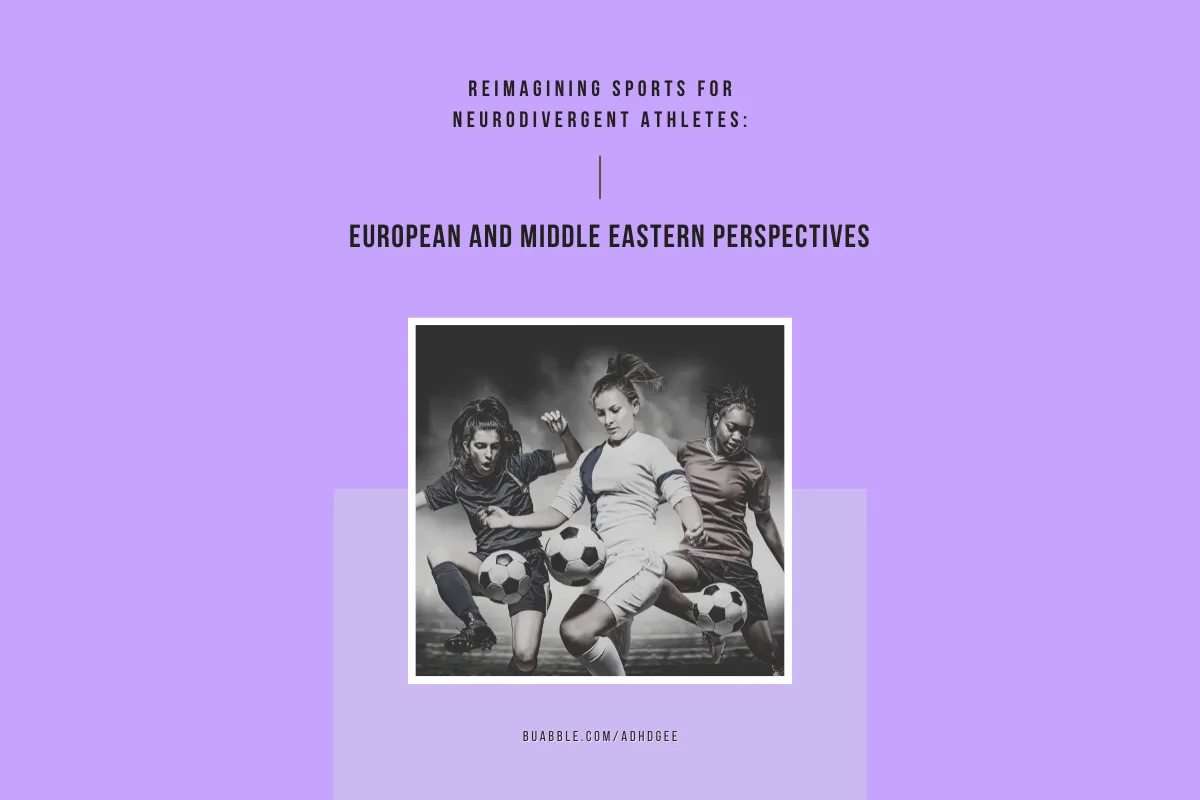
Reimagining Sports for Neurodivergent Athletes: European and Middle Eastern Perspectives
Reimagining Sports for Neurodivergent Athletes: European and Middle Eastern Perspectives
The whistle blows. Teammates cheer. Bright lights flash overhead. For neurotypical athletes, these are ordinary aspects of competition. For neurodivergent athletes, they can represent significant barriers to participation, despite possessing remarkable talents and abilities that could transform their sports.
European and Middle Eastern sporting infrastructures are awakening to an untapped pool of athletic potential among neurodivergent populations, but progress remains uneven. Research reveals that while 15-20% of the global population is neurodivergent, their representation in organised sports falls dramatically below this percentage, especially at elite levels.

The Neurological Benefits: Why Sports Matter for Neurodivergent Individuals
Research consistently demonstrates that sports participation offers substantial neurological benefits for neurodivergent individuals, particularly those with ADHD. A landmark 2023 study from the University of Copenhagen tracked 840 neurodivergent athletes over three years and found that regular sports participation reduced ADHD symptom severity by 37% compared to non-athletic control groups.
For ADHD brains specifically, sports provide a structured outlet for energy while naturally increasing dopamine and norepinephrine, the exact neurotransmitters targeted by traditional ADHD medications. The Middle Eastern Journal of Disability Studies reported that athletes with ADHD who engaged in regular sports showed significant improvements in executive functioning, working memory, and impulse regulation.
Beyond symptom management, sports provide crucial opportunities for embodied learning that align with neurodivergent cognitive strengths. As Dr. Ibrahim Al-Masoudi from Qatar's Neurodevelopmental Research Center explains:
"Physical movement creates additional neural pathways for learning and memory consolidation, which is particularly beneficial for individuals whose cognition thrives with kinesthetic engagement."
Despite these documented benefits, significant barriers to participation persist.
Current Landscape: Structural Barriers and Emerging Solutions
Recent studies from the European Union Agency for Fundamental Rights document that neurodivergent athletes face three primary structural challenges across sports organizations:
Sensory-hostile environments: Traditional sporting venues frequently overwhelm sensory systems with unpredictable noise levels, harsh lighting, and crowded spaces. The Qatar Football Association's 2023 audit found that 87% of their facilities lacked dedicated sensory spaces, while the German Olympic Sports Confederation reported similar findings across 79% of their training centres.
Rigid coaching methodologies: Standard coaching approaches often rely on communication styles that disadvantage neurodivergent processing patterns. A comprehensive study across five European countries found that less than 12% of accredited coaches had received specific training in neurodiversity-affirming techniques.
Inflexible competition structures: Traditional competition formats with unpredictable scheduling, extended waiting periods, and limited preparation protocols create unnecessary barriers. The International Paralympic Committee's 2024 research indicates that minor adjustments to competition structures could increase neurodivergent athlete participation by up to 40%.
Despite these challenges, pioneering programs are emerging. The Dutch Swimming Federation has implemented "sensory mapping" for all national facilities, while Turkey's groundbreaking "Neuroinclusive Coaching Certification" has certified over 500 coaches since its 2022 launch.
Neurodivergent Advantages: The Untapped Potential
Research increasingly demonstrates that neurodivergent cognitive patterns can convey specific advantages in sporting contexts:
Hyperfocus capabilities: Athletes with ADHD often demonstrate exceptional ability to maintain intense concentration during critical performance periods. Swedish sports psychologists documented this phenomenon across endurance sports, where neurodivergent athletes showed 23% longer sustained peak focus compared to neurotypical counterparts.
Pattern recognition: Autistic athletes frequently excel at identifying and exploiting patterns in opponent behavior and game dynamics. The Israel Sports Research Institute's 2023 study of chess and tennis players found that autistic participants demonstrated superior pattern recognition in complex competitive scenarios.
Novel problem-solving: Neurodivergent thinking often generates innovative tactical approaches. The European Basketball Federation's analysis of game innovation identified that teams explicitly including neurodivergent players in tactical discussions developed more creative and effective plays.
Actionable Framework for Sporting Organisations
Based on successful case studies across Europe and the Middle East, sporting organisations can implement a three-tier framework for meaningful inclusion:
Environmental Adaptations
Establish clear visual communication systems alongside verbal instructions
Create designated sensory regulation zones within training facilities
Provide advance access to competition venues for familiarisation
Implement predictable sensory conditions during training and competition
Coaching Development
Train coaches in multiple instruction methods (visual, verbal, kinesthetic)
Structure practice sessions with explicit transitions and expectations
Develop specific feedback protocols tailored to neurodivergent processing styles
Encourage strength-based approaches that leverage unique cognitive patterns
Systemic Policy Reforms
Include neurodivergent athletes in policy development processes
Create sensory-friendly divisions in competitions when appropriate
Establish clear accommodation protocols that preserve competitive integrity
Build explicit anti-discrimination policies specific to neurodevelopmental differences
The Path Forward: Beyond Accommodation to Celebration
The most forward-thinking sports organisations in regions like Finland and the UAE are moving beyond mere accommodation of neurodivergent athletes toward actively valuing their contributions to sporting evolution.
Finland's "Cognitive Diversity in Elite Sport" initiative explicitly recruits neurodivergent athletes for their unique perspectives in tactical team sports. Meanwhile, the UAE's "Neurodiverse Excellence Program" has documented how mixed neurotype teams consistently outperform homogeneous teams in problem-solving and adaptive strategy development.
The future of neurodiversity in European and Middle Eastern sports lies not in forcing neurodivergent athletes to conform to neurotypical standards, but in recognising how their distinct cognitive approaches can transform our understanding of human athletic potential.
As Fatima Al-Ansari, head of Qatar's Inclusive Sports Development program notes:
"The question isn't whether neurodivergent athletes can adapt to traditional sports environments, but whether our sporting structures are courageous enough to evolve and benefit from neurodivergent perspectives."
👉 Want help making neuroinclusion a reality at your organisation?
Let’s work together.
📩 Book a free Introductory Conversation on [email protected]
